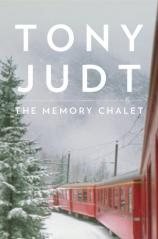The Memory Chalet
Review
The Memory Chalet
In 2008 historian Tony Judt was diagnosed with ALS. Two years
later he was dead at age 62. In the interval that marked the course
of his dreadful disease, Judt discovered, as he struggled wakeful
through the long hours of darkness, that he was “writing
whole stories in my head in the course of the night,”
fashioning them out of fragments of memory he stored in
compartments that matched the rooms of a Swiss chalet he had
visited as a 10-year-old. The product is this volume of more than
two dozen penetrating essays (most of them previously published in
the New York Review of Books) --- insightful, reflective,
caustic, humorous --- that range over the course of a vital,
productive, if too brief, life.
The opening section of THE MEMORY CHALET captures Judt’s
reminiscences of his life growing up in London after World War II,
skillfully evoking that period while at the same time moving
effortlessly from personal recollection to commentary on broader
social and cultural issues. In “Austerity,” he recalls
the “characteristic shortages and grayness of postwar
Britain” but recognizes that “austerity was not just an
economic condition: it aspired to a public ethic,”
contrasting that with contemporary life in which we have
“substituted endless commerce for public purpose, and expect
no higher aspirations from our leaders.” In a more
lighthearted vein is “Food,” Judt’s paean to the
pleasures of Jewish and Indian cuisine, a stark contrast to
standard English fare (“Just because you grow up on bad food,
it does not follow that you lack nostalgia for it.”).
“Cars” pays a poignant tribute to his father’s
obsession with the Citroën: “What other men sought and
found in alcohol and mistresses, my father sublimated into his love
affair with a car company --- which no doubt accounts for my
mother’s instinctive hostility to the whole business.”
Travel --- by bus, train and ferry --- is a recurring theme, not
surprising for a man who described his final illness as like living
in a prison that grows smaller by six inches every day.
The central group of essays range widely over Judt’s
education, formal and informal. There’s a portrait of
“Joe,” his German teacher, “a gaunt, misanthropic
survivor of some unspecified wartime experience,” whose
brutal teaching methods “would be impossible today.”
Yet in the end, Judt, who spent a lifetime teaching, concludes that
“being well taught is the only thing worth remembering from
school.” An unsentimental account of his teenage experiences
on a kibbutz explains what turned him against the idea of
collectivism and into a “universalist social democrat.”
Several essays touch on the protest movements of the 1960s.
Admonishing the lack of seriousness demonstrated by his baby boomer
contemporaries, he writes, “We did not change the world;
rather, the world changed obligingly for us.”
The final section of THE MEMORY CHALET offers an assortment of
perspectives on the subject of identity, focusing on Judt’s
adopted homeland, the United States. Having driven cross country
seven times, by his count, his sense of this country was broad and
deep, affectionate and yet without illusions: “It is an
old-new land engaged in perennial self-discovery (usually at
others’ expense): an empire sheathed in preindustrial myths,
dangerous and innocent.” “Mid-Life Crisis”
explains his decision to learn Czech at age 32, a decision that had
a profound effect on his life as a “public
intellectual” (a term he professes to find
“unhelpful”). In “Toni,” a piece whose
ending is so stunning (and so fitting) it would border on the
criminal to reveal it, he explores the question of Jewish identity.
Though Judt was a nonobservant Jew whose views on Israel (he was a
harsh critic of Zionism and favored a single-state solution to the
Israeli-Palestinian conflict) provoked considerable criticism in
his later years, his insights on what it means to be Jewish in the
post-Holocaust world are worth quoting at length:
“I choose to invoke a Jewish past that is impervious to
orthodoxy: that opens conversations rather than closes them.
Judaism for me is a sensibility of collective self-questioning and
uncomfortable truth-telling…of awkwardness and dissent for
which we were once known. It is not enough to stand at a tangent to
other peoples’ conventions; we should also be the most
unforgiving critics of our own. I feel a debt of responsibility to
this past. It is why I am Jewish.”
That same sensibility is the hallmark of Tony Judt’s
incisive mind as it shimmers across the pages of this slim, but
deeply impressive, collection. Without the limitations imposed by
his terrible affliction, who knows if he would have produced these
essays. That he did is an extraordinary tribute to him and a
priceless bequest to us.
Reviewed by Harvey Freedenberg (mwn52@aol.com) on February 24, 2011
The Memory Chalet
- Publication Date: November 11, 2010
- Genres: Essays, Nonfiction
- Hardcover: 240 pages
- Publisher: Penguin Press HC, The
- ISBN-10: 1594202893
- ISBN-13: 9781594202896




